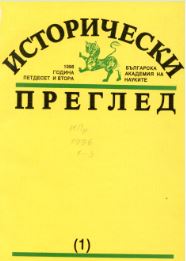Българският преход след 1989 г. в исторически контекст
The Bulgarian Transition after 1989 in Historical Context
Author(s): Iskra BaevaSubject(s): History, Political history, Recent History (1900 till today), Special Historiographies:, Transformation Period (1990 - 2010), Post-Communist Transformation
Published by: Институт за исторически изследвания - Българска академия на науките
Keywords: postcommunist Eastern Europe; Bulgarian Communist Party; Great National Assembly; new Constitution; Union of Democratic Forces
Summary/Abstract: The overthrow of Todor Zhivkov on November 10, 1989 marked the beginning of the Bulgarian transition. It was prepared and accomplished by a reformist faction in the leadership of the Bulgarian Communist Party (from April 1990 – Bulgarian Socialist Party). This personal change stood at the beginning of the Bulgarian path to democracy as a part of the common process, going in the postcommunist Eastern Europe. The first transitional period ended with the elections for a Great National Assembly – June 10–17, 1990. The Bulgarian opposition groups were established in this period and the first changes were made in the power institutions. The second period was the only time in contemporary Bulgaria, when there was a hesitation between parliamentary and extra parliamentary political actions. It ended with the approval of the new Constitution. The third period brought the real change of the subjects of political power. The five years period of transition in Bulgaria after three times free and democratic elections brought the establishment of pluralistic parliamentary system. The main political force the Union of Democratic Forces (UDF) and BSP – managed to compete with each other in democratic manner and to accomplish the double change of power, which is the real test for democracy.
Journal: Исторически преглед
- Issue Year: 1996
- Issue No: 1
- Page Range: 90-113
- Page Count: 24
- Language: Bulgarian
- Content File-PDF

